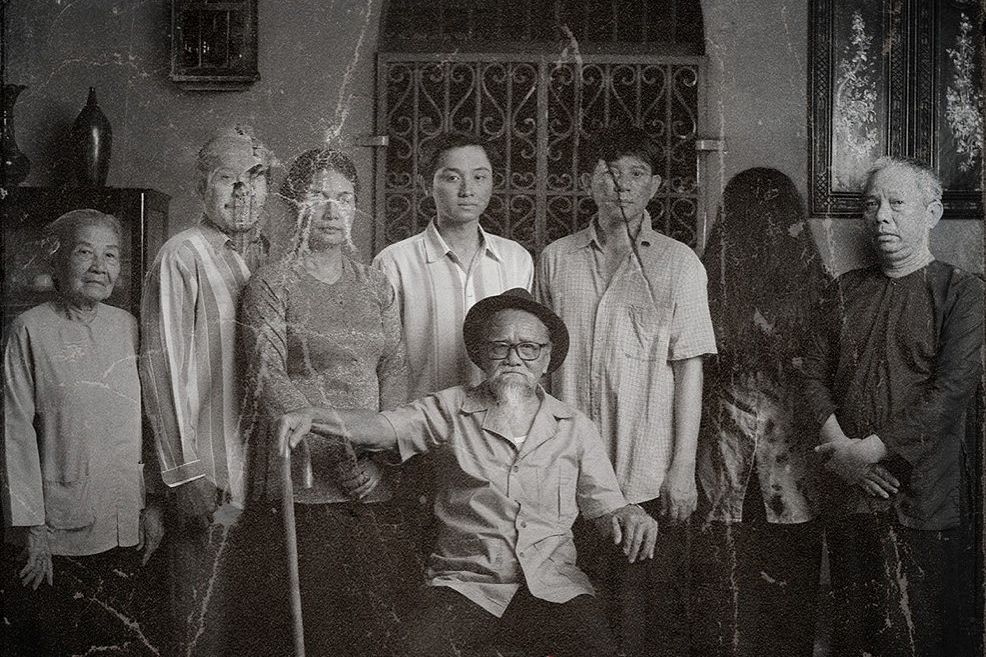Monsoon is Vietnam-shot film directed by Hong Khaou that was released earlier this year. It is spoken by Lee (David Tran) to Kit (Henry Golding) as they have tea on a Saigon sidewalk and references the latter's return to Vietnam for the first time since leaving as a child.
When he was six, Kit's family fled following the war and eventually made it to the United Kingdom, while Lee, Kit's childhood best friend, stayed in Saigon with his family. The movie begins with Kit arriving in Saigon with his mother's ashes, while his older brother will arrive the following week with their father's ashes.
Monsoon is a very quiet, interior film, with Kit featured in almost every shot and a few other characters — including a romantic interest in an American expat named Lewis (Parker Sawyers) — passing through scenes. The pacing and editing are deliberate, and there is almost no dialogue for the first 10 minutes.

Lewis and Kit travel by bike on a local Saigon street. Photo via Peccadillo Pictures.
Static tripod shots are common, and Golding does much of his acting through facial expressions and body language; many of his personal interactions are awkward and restrained, and he really only comes to life when he talks to his nephews back in the UK on FaceTime.
For cinematography nerds, there are some very well-done shots, including two sequences in which the camera starts with Kit in the frame outside the ground floor of a building. He then walks off-frame as the camera slowly pans up, and then re-enters the frame on the second floor of the building in question.
Several long, very slow zooms are also used, and the birds-eye opening shot of a busy Saigon intersection from a slowly rising drone gives a hint that viewers are in for a visual treat.
Another unique aspect of Monsoon is that there is almost no score: unless I missed something, all of the music and sounds in the movie are diegetic until late in the film when 'Tình Đêm Liên Hoan' by Thanh Lan plays as Kit rides a xe ôm over Hanoi's Nhat Tan Bridge.
This adds to the introspective nature of the film, as Kit stares pensively, for example, over Saigon from his AirBnB balcony in Thao Dien's Masteri complex, or at the countryside as he takes the train up to Hanoi.
One of the best aspects of the movie is the complete absence of tropes or stereotypes related to Vietnam, something that cannot be said about 2020's other big Vietnam-filmed, internationally produced release, Spike Lee's dreadful Da 5 Bloods.
Khaou, the director of Monsoon, is not Vietnamese, but his Chinese-Cambodian family fled the Khmer Rouge to Vietnam when he was a baby, and then moved to the United Kingdom when he was eight. This background clearly shows in the script and on the screen, as the people Kit interacts with seem like actual humans, not Hollywood caricatures created by someone who has never been here. (For that matter, Golding was born in Malaysia and moved to the UK when he was eight as well.)
Saigon and Hanoi are also presented as they are, warts and all, with no fetishizing of "weird" food or sights that may give viewers elsewhere the impression that life here is bizarre. (Residents, meanwhile, can see how many places they recognize: in Saigon, Kit spends time at Rogue, Soma and The Deck, and checks out Sophie's Art Tour in Hanoi.)
One common topic that Monsoon doesn't escape is the war, but this is understandable given Khaou's personal experience, and it is handled deftly without being overbearing: Kit's parents never reconciled with the country they fled and had no interest in returning while alive, while Lewis' dad fought in the US Army and carried scars for the rest of his life. At one point, Lewis says that "kids here don't care about the war," which is entirely accurate.

Lee (David Tran) and Kit in District 5. Photo via Peccadillo Pictures.
In a June 2019 interview with Variety, Khaou shared that initially, Lewis' character was a white American named Hank: "Along the way, through the various notes that came from the execs and financiers, it was felt that the Hank character's voice — the dominant white American, in terms of the subtext of the war — had been heard before."
This is inarguably true, and it's good that the script was revised to include Lewis, who is Black. (Incidentally, Da 5 Bloods also avoided that dominant white American view, but transposed many of its ridiculous presuppositions about Vietnam and Vietnamese through a Black American lens.)
Beyond that, it was incredibly refreshing to see contemporary Vietnam presented without prejudice or pretense, and I can't think of any recent foreign-produced movies set here that have done this so effectively.
Lee, Kit's childhood friend, runs what appears to be a relatively successful mobile phone shop and lives a middle-class life in District 5. He is bemused by the fact that Kit has lost his Vietnamese and struggles to find childhood landmarks since Saigon has changed so much in the intervening decades, though he does recall their early visits to Ba Chieu Market.
The closing line from the start of this article lays bare the tension at the heart of so many families who left their home country to start a new life somewhere else: Kit's parents gave up everything to flee (his father worked for an official in the southern government), yet the country Kit returns to is thriving to the point of being unrecognizable.
There is no neat Hollywood ending to Monsoon, leaving viewers to ponder its themes of loss, estrangement and disconnection. This beautifully shot, emotionally restrained film is highly recommended, and immediately vaults toward the top of contemporary Vietnam movies created by foreign production teams.
For readers in Vietnam, Monsoon can be rented or bought via iTunes or Amazon Prime Video.
[Top photo via Peccadillo Pictures]
















